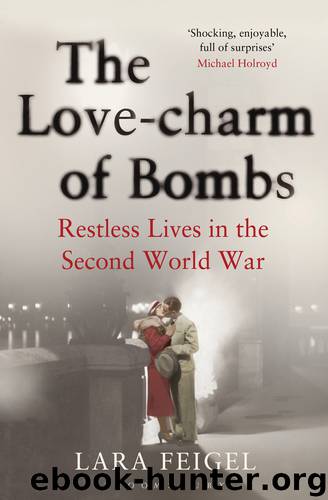The Love-Charm of Bombs by Lara Feigel

Author:Lara Feigel
Language: eng
Format: epub
Publisher: Bloomsbury Publishing
Published: 2013-12-22T16:00:00+00:00
When he suggested having Mark, I thought to myself, ‘You’ve had all these women and you live with them and you say you love them and then come back after all these years to me, and expect to pick up everything just as it was,’ and I said to him, ‘no, no, nothing like that,’ and he said, ‘oh, very well,’ quite cheerfully.
Hilde Spiel and Peter de Mendelssohn found VE Day more of a satisfying climax to the war than Greene did. They celebrated the German capitulation itself at the home of Kingsley Martin, the editor of the New Statesman. Then on 7 May Peter called Hilde from the Ministry and told her to come immediately into town. They walked down Piccadilly looking at the endless crowds of excited people. The next day, like Bowen and Greene, they joined the thousands of Londoners wandering dizzily through a city whose lights were allowed to flare up again after five and a half years. They were part of the crowd singing ‘For he’s a jolly good fellow’ up to Churchill on his balcony. Near the end of her life, Spiel looked back on this as the pinnacle of her happiness in London. ‘Never before or after have I experienced such a collective intoxication of happiness, never again such certainty of being at home here and nowhere else.’
The next evening, the government put on a display of searchlights. These were the same flares that had lit up the sky in wartime, but now Londoners could enjoy the lighting effects without worrying about the damage they portended. Walking home at midnight from a dinner party, Elizabeth Bowen watched the searchlights from Grosvenor Square: ‘each one staggered and whirled around the sky, scribbled, darted, and crashed into others’. The tips of the lights met, as though pinpointing an enemy plane, but this evening they seemed to be drunk, collapsing against each other for support; ‘they also managed to look extremely lewd’. Elizabeth walked towards the park and, once she was halfway down Baker Street, the searchlights began to send up vertical pillars of light, so that ‘the whole of the darkness above London became a Gothic cathedral’. They then tipped over, dripping white rain towards the ground. ‘I suppose’, Elizabeth wrote to Charles, ‘that everyone, in those two days, found one thing that was in their own language, and seemed to be speaking to them, specially. The searchlights were mine. For me they were the music of the occasion.’
In the aftermath of war, Elizabeth Bowen began to take stock. Quickly, she began to look back on the war as an exhilarating period and to find what followed anticlimactic. With the threat of death removed, everyday life became less precious. Without Charles, life had lost its sheen. ‘I would not have missed being in London throughout the war for anything,’ she would write in an autobiographical note in 1948; ‘it was the most interesting period of my life. It was interesting to see the quiet old English capital converted into a high-pressure cosmopolitan city.
Download
This site does not store any files on its server. We only index and link to content provided by other sites. Please contact the content providers to delete copyright contents if any and email us, we'll remove relevant links or contents immediately.
| Afghan & Iraq Wars | American Civil War |
| American Revolution | Vietnam War |
| World War I | World War II |
Waking Up in Heaven: A True Story of Brokenness, Heaven, and Life Again by McVea Crystal & Tresniowski Alex(37808)
Empire of the Sikhs by Patwant Singh(23085)
We're Going to Need More Wine by Gabrielle Union(19046)
Hans Sturm: A Soldier's Odyssey on the Eastern Front by Gordon Williamson(18590)
Leonardo da Vinci by Walter Isaacson(13336)
The Radium Girls by Kate Moore(12028)
Tools of Titans by Timothy Ferriss(8394)
Educated by Tara Westover(8054)
How to Be a Bawse: A Guide to Conquering Life by Lilly Singh(7486)
Permanent Record by Edward Snowden(5847)
The Last Black Unicorn by Tiffany Haddish(5635)
The Rise and Fall of Senator Joe McCarthy by James Cross Giblin(5280)
Promise Me, Dad by Joe Biden(5153)
The Wind in My Hair by Masih Alinejad(5095)
A Higher Loyalty: Truth, Lies, and Leadership by James Comey(4963)
The Crown by Robert Lacey(4814)
The Iron Duke by The Iron Duke(4354)
Joan of Arc by Mary Gordon(4110)
Stalin by Stephen Kotkin(3965)
